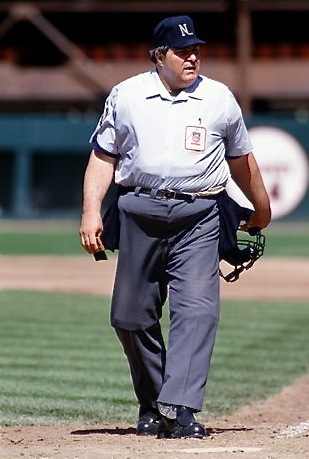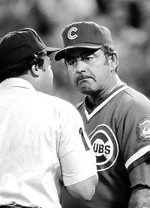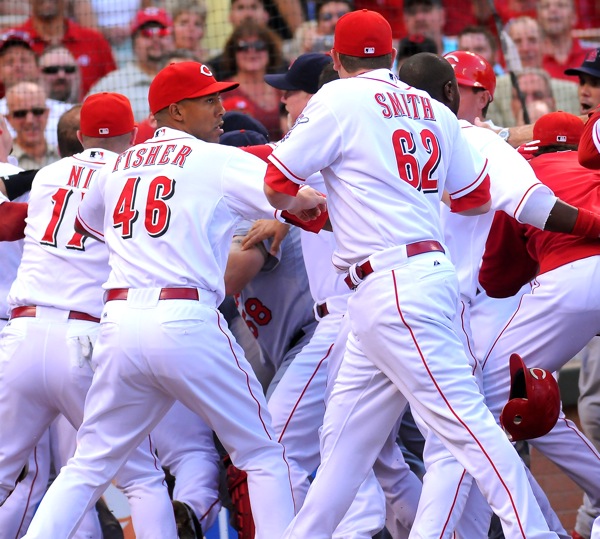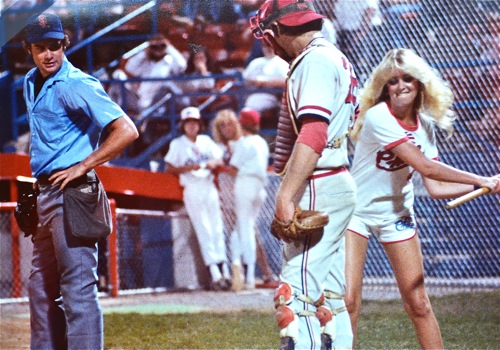A recent watering hole discussion led to the age-old question…when there’s nothing else to talk about in baseball. What does it REALLY take to get thrown out of a game?
 Watching a recent Reds game (but not really) with a couple of thirsty friends, Reds manager David Bell got ejected over Kyle Farmer being hit by Braves pitcher Spencer Striker…with a pitch traveling 100 miles per hour.
Watching a recent Reds game (but not really) with a couple of thirsty friends, Reds manager David Bell got ejected over Kyle Farmer being hit by Braves pitcher Spencer Striker…with a pitch traveling 100 miles per hour.
The retaliation rule in baseball is a terrible rule, and was instituted during my days as a minor league umpire back in the late 70s. It made policing knockdown pitches the responsibility of the umpires -warnings, ejections, and subsequent reports to the league office – and then the league president usually did nothing, because league presidents were little more than puppets of the farm directors.
But in this case (David Bell), the conversation quickly turned to ejections, in general, because the Reds are bad, they’re going to dump whatever expensive players they have after the all-star game…and then promise to be better again next year. You want to know who should be ejected instead of David Bell? The Castellinis!
But back in the day I had my share of experience with excusing people early from minor league baseball games…so the question was asked, “What does it really take to get a manager or player thrown out?”
Or, “What were the best ejections you ever had?” That makes for a better story, and a couple more rounds.
Profanity, of course, is one element. And not the garden variety, because a lot of people in baseball (at that time) couldn’t say Happy Mother’s Day without spicing it up with some choice four-letter words. But it had to be directed at the umpire, personally, to throw somebody out.

At 6’5″ and over 300 pounds, John McSherry was recognized as one of baseball’s best umpires. But regarding baseball fights he once said, “Act like you care for a second, then let ’em fight.”
For instance, if someone said, “That’s a horse**** call”, that was no big deal.
If they said, “You’re a horse**** umpire”, that was another matter, and the clubhouse boy would immediately go turn on the shower.
Throwing bats and helmets would do it, because that was viewed as showing up the umpire, or general disregard for the game, itself. Billy Hitchcock, the old president of the Southern League always said he didn’t want young children to see grown men behave that way…because they might go back to their Little League game and do the same things.
But here’s some of the more memorable ejections. Some were serious, and many were not.
For instance, Jack McKeon managed in AAA Denver one summer and told me on the 4th of July that he wanted to get tossed to entertain the crowd. There were about 60,000 at Mile High Stadium for 25 cent beer and fireworks, and McKeon’s team wasn’t very good. “Let’s give ‘em a show,” he laughed. And he did.
I don’t actually remember who was my first, but I remember former big leaguer Joe Lis leading off in a suspended game from rain the night before in Springfield. Illinois in 1979. Lis was unhappy about being in Triple-A, and took the first three pitches right down the chute for strike one, strike two, and strike three. On strike three he turned to me, offered the bat, and said, “Here, put this someplace where you’ll remember it every time you sit down.”
That’s all it took.
Another time, in Wichita, former Cubs manager Lee Elia was managing the Oklahoma City team and got ejected for arguing a fair-foul call on a home run.

Lee Elia in a lighter moment….
“All I want to know is if you saw it good,” he said.
“I saw it good,” I answered. “It was ten feet fair.”
But that wasn’t good enough for Elia, who later went ballistic in a famous tirade towards Chicago fans when he was the manager of the Cubs. On a night where the field temperature on the Astroturf in Wichita was 112 degrees, Elia was ten degrees hotter. See ya’ later.
I was working the plate the next night and Lee sent a player to home plate with the lineup card. When he handed it to me he said, “Lee wrote you a note on the back. You’re supposed to read it.”
He had written, “You’re going to die in Triple-A.”

They’re bigger, stronger, and work out all winter long. So when the fightin’ starts…just get out of their way.
I looked over at him and he was nodding his head, as if to say…”Yeah, I wrote it.”
See ya’ later.
One night in Des Moines there was a pretty good fight with Omaha over pitches high and tight, and I was working the plate. This erupted very quickly, and it got going before anyone could be warned. It had started the night before when the two teams were in Omaha with a different umpiring crew, and all it took was one pitch – the first pitch of the game. We just let ‘em fight.
Funny thing about a baseball fight. When they discover that you don’t care…when there’s no security…when they realize that someone might really get hurt and lose a career…there’s more pushing and shoving than there is actually fighting.
In this case Des Moines manager Joe Sparks got ejected not for fighting, or throwing at hitters…but for complaining that none of us stepped in to try and stop it.
“Someone could get hurt,” he whined. “You’re supposed to issue warnings.”

I wasn’t there to break up fights…in Memphis, 1979, watching Cardinal catcher Glen Brummer get dusted.
“Not tonight,” I said. That’s all it took.
I worked a college doubleheader in Rome, Georgia once and the coach from the College of Charleston started complaining, I swear, during the Star Spangled Banner. Knowing the rule about a one-game suspension if you got ejected in college, my partner and I were waiting for a chance to get rid of him, and it didn’t take long. In the third inning he came out yelling about whether a popup to short right field constituted being an infield fly rule out. It does, I dumped him, and the rest of the afternoon was better for everyone…because he missed the second game, too.
Hall of fame manager Jim Leyland was one of the best when he came out to argue.
Sometimes he’d say, “All I want you to tell me is that you missed that play. You tell me you missed it and I won’t say another word.”
“OK, Jim, I missed it,” I told him one night in Lakeland, Florida.
“I didn’t see it,” he said, and walked off.



